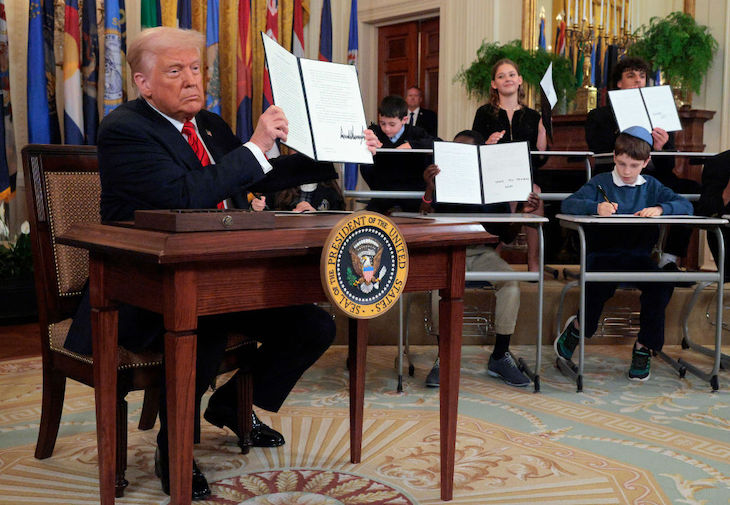Over the past few months, I’ve wished that almost anyone was education secretary instead of Bridget Phillipson, who seems to be on a one-woman mission to destroy thirty years of school reforms. I’ll be honest, though: by ‘anyone’, I didn’t mean Donald Trump. But this week, President Trump showed how much better he would be in the job than Phillipson, signing an executive order instructing her US counterpart, Linda McMahon, to begin dismantling the US Department of Education. If only Keir Starmer had arrived in Downing Street last July and ordered Phillipson to set about the process of doing herself out of a job. Instead, she is proving with every passing day why centralised control of education is bad for schools.
For the first time since 1979, we have a Labour education secretary who is behaving as if she is receiving daily instructions from the National Education Union
For much of the last third of the twentieth century, state education was a disaster. In his excellent 1998 book, Public Spending, Evan Davis writes of a comedian destroying a heckler with the put down, ‘Who cuts your hair, the council?’. Cue mass audience laughter. But, Davis points out, we hand over the education of our children to councils even though we don’t even think them capable of a decent haircut.
We can have our disagreements as to why schools were so bad. Was it the comprehensive revolution? Was it so-called progressive teaching methods? Was it the grip of the teaching unions? Whatever cause we alight on, the fact is that standards were bad and getting worse.
The timing of Davis’ book is important, because the process of serious school reform began with the election of the Labour government the previous year. The work of David Blunkett and Andrew Adonis in devolving decision making and responsibility away from the centre and local authorities to schools themselves, most obviously through academy schools funded directly by government, was near miraculous in the way it changed schooling for the better.
One of the main blocks on reform was the Department for Education itself, which was gripped by and enforced the dogma of educationalists whose ideas had failed pupils for so long (such as the embrace of ‘look-say’ rather than phonics as the method for teaching reading). But Blunkett did not abolish the department – he circumvented it, setting up what was a de facto alternative department inside the existing building, led by the often-forgotten hero of school reform, Michael Barber.
Those reforms were accelerated in 2010 when Michael Gove, now editor of this publication, became education secretary, with the introduction of free schools and the insistence that, if a school funded by the local authority is judged as ‘inadequate’ by Ofsted, then it must become an academy (a requirement which Phillipson is now scrapping).
The broad trajectory of those reforms has been a consensus across governments for the past three decades and the foundation of the increase in school standards. But there has always been significant opposition in Labour to the reforms, first under Tony Blair in government and latterly in opposition. Now, for the first time since 1979, we have a Labour education secretary who is behaving as if she is receiving daily instructions from the National Education Union which, like the famed Japanese jungle fighters who carried on long after VJ Day, has never reconciled itself to the reforms. The twist in that tale, of course, is that with Phillipson in charge, the NEU’s fight has paid off. It has a minister who is taking a wrecking ball to much of the progress made over the past three decades.
Two examples: academies can hire staff who do not have qualified teacher status (I have a friend who worked for a hedge fund and is now a maths teacher) and they are allowed to diverge from the national curriculum. But under the government’s Children’s Wellbeing and Schools Bill schools it will be illegal for schools to employ anyone without a teaching qualification (such as my friend, who would be lost to teaching) or to depart from the national curriculum. It is an act of educational vandalism unparalleled this century. Instead of the devolution of responsibility which has been the hallmark of our educational success, Phillipson is centralising power in education both to herself and to local authorities.
What a contrast, not just with the past three decades but with President Trump’s abolition of the Department of Education. Put it this way: if our own education department was abolished, the only issue would be whether it would have no impact on anything of value, or whether standards might actually improve. So, when it comes to education, more Trump, less Phillipson should be the mantra.







Comments